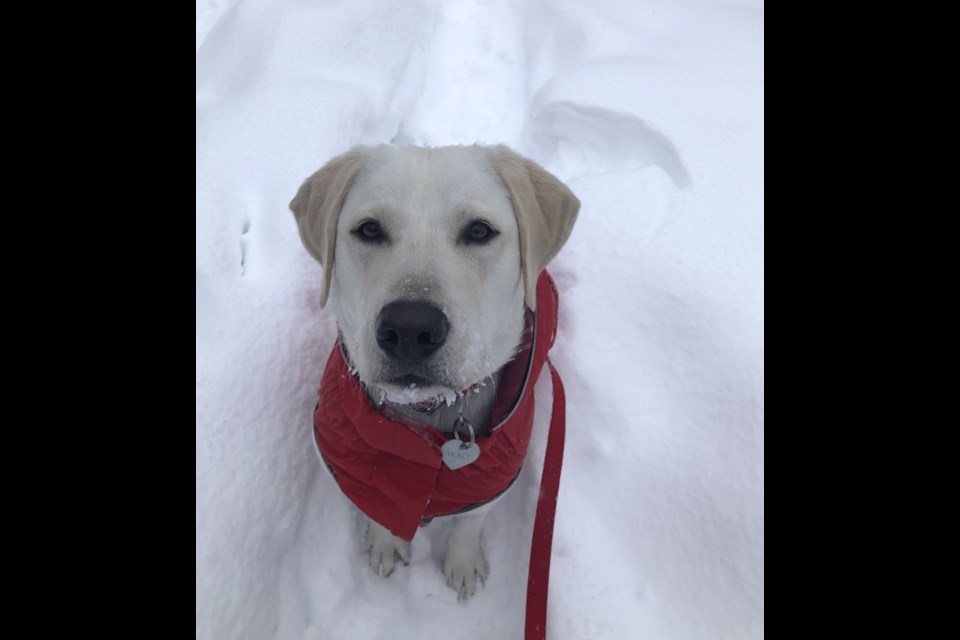Molly is on the mend, but it has been a rough few days for the white labrador after she ingested methamphetamines while on a nightly walk around her downtown Squamish home.
"We just did a very kind of usual short walk downtown. And then, within an hour or two, I quickly recognized that something was going on and very, very wrong. But of course, I had no idea that it was drugs," said Lara Hinkson, Molly's owner.
Molly is a therapy dog who works with adults with developmental disabilities and is, by training and nature, very laid back but became very restless when the pair returned from their walk.
"She was super, super restless. She couldn't sit down. Her eyes were super, super dilated. And she was just foaming at the mouth."
She was also drooling profusely and shaking her head, added Hinkson.
It was after hours for the local vets, but because two-year-old Molly was so sick, Hinkson didn't feel able to drive alone down the dark highway to the closest 24-hour vet, Mountainside Animal Hospital in North Vancouver, so it was a long night's wait to seek care.
At Sea to Sky Veterinary Clinic the next morning, tests showed Molly had ingested the drug.
Like all labs, Molly loves to sniff everything and could also have eaten something quickly on the walk, so it is unclear how exactly she was exposed to the meth, Hinkson said.
After a few days of rest, fluids and vet care, she is back home and doing well, but it was a traumatizing event that shook Hinkson.
She is speaking out publicly because she wants folks to be aware that this is possible in Squamish. She also thinks it points to the need for a 24-hour vet clinic in town.
What to watch for and do
Veterinarian Dr. Jordie Schnarr cared for Molly at Sea to Sky Veterinary Clinic.
Schnarr said it was the first methamphetamine ingestion she has seen in town in a dog, though she saw it when she worked in the city.
She does see other drug toxicity cases in town "frequently," she said, especially in the warmer months of the year when pets and people are out and about more.
As for what to watch for in your pet, Schnarr said that, like with humans, how pets react is quite individual, depending on many factors, including the type of drug, dose and the size of the dog.
"Just like with people, every drug toxicity, when it comes to …THC versus opioids versus amphetamines, they're all going to manifest differently," Schnarr said.
In general, though, a dog will start acting out of character.
For example, about 45 minutes after a walk, a dog may start swaying, not walking normally.
With THC ingestion, the dog may have urinary incontinence.
"Some of the drugs like opioids and amphetamines can actually be a bit constipating. Sometimes you'll see drooling or vomiting because often, our pets will feel nauseous as well. But typically, neurological signs tend to be the most prevalent thing that we'll see," she said.
Whatever drug it is, it is important the pet is seen by a vet as soon as possible, she said.
If it is the middle of the night and there isn't one in town available, making the drive down to North Van's animal hospital is likely the best idea, she said.
"Particularly if it is an opioid toxicity or methamphetamine toxicity; there's a window of time there where we can intervene and hopefully be successful," she said.
While ingesting THC is rarely deadly, it can be hard on the dog, especially if it is in a butter or an oil, because that can stay in their system.
Opioids and amphetamines, depending on the dose, are more serious situations, however.
Even a sniff of fentanyl, for example, can be enough to harm a pooch.
"They can start seizuring; they can go into multi-organ failure," Schnarr said, adding she doesn't want to create fear in owners in town.
Dogs need to go outside, sniff and live their lives, and, with treatment, the prognosis is often very good for dogs like Molly, who end up consuming such a substance.
She said ideally, as Squamish grows, it will have more dog "sanctuaries." Places that are safe just for them in town.
And more washrooms for folks who don't have access to one would be helpful, she said, as she sees drugs in dogs’ systems from exposure to the actual drug or from eating human feces that contains it.
As for a 24-hour clinic, she said her clinic has increased hours to later in the day to accommodate more folks and their fur family members.
While the community isn't yet at the tipping point to be able to accommodate our own around-the-clock clinic yet, with Squamish's growth, she sees that becoming a reality down the road.
"I think it's on the mind of not only every pet owner in Squamish but also everybody in the veterinary industry as well because it's certainly needed, and it's not just here in Squamish, it's the entire Sea to Sky."



